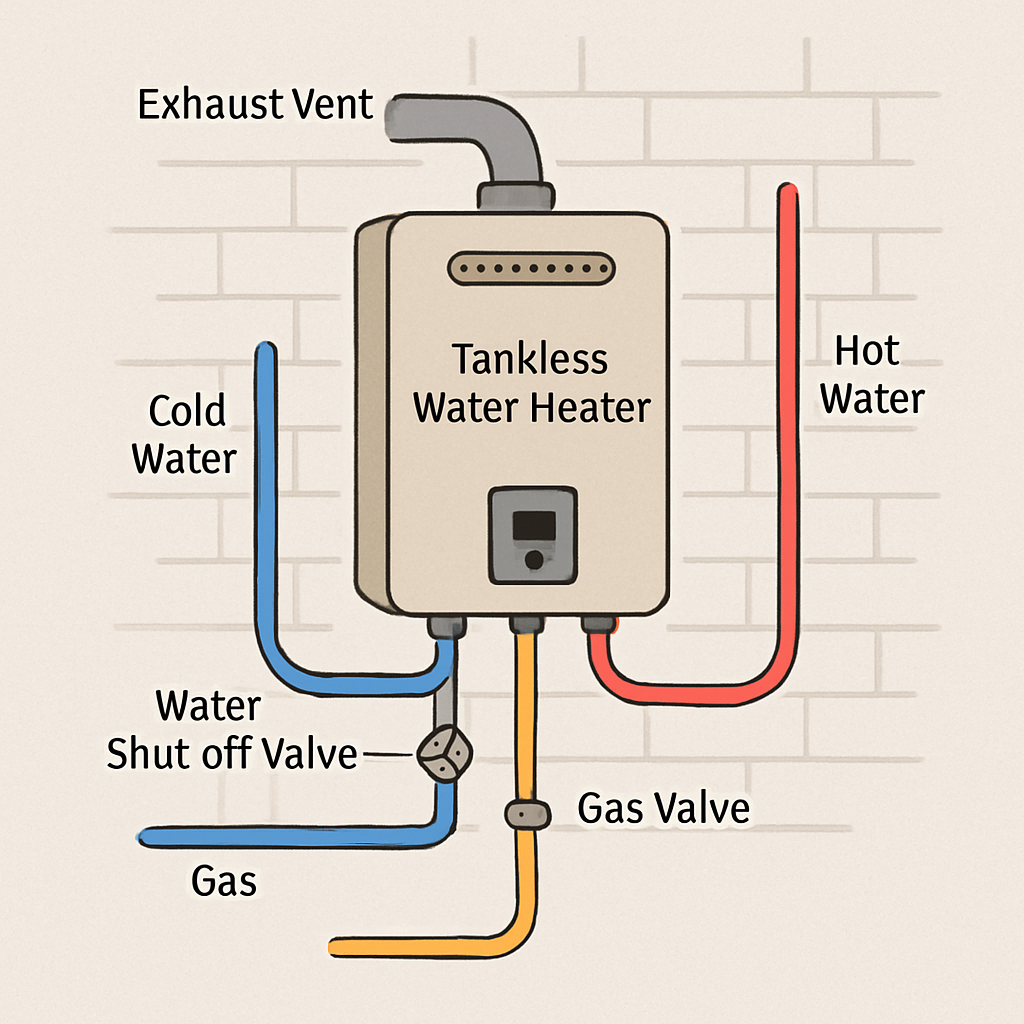why switch to a tankless water heater?
Tankless water heaters are revolutionizing home water heating. They provide hot water on demand, eliminating the need for bulky storage tanks.
These systems are more energy-efficient than traditional heaters, offering significant savings on energy bills. Their compact design makes them perfect for small spaces and modern homes.
Eco-friendly and efficient, tankless water heaters contribute to a lower carbon footprint. They come in various types, including electric, gas, and combo models, catering to different needs.
Choosing the best rated tankless water heater can be daunting. This guide will help you make an informed decision.
What Is a Tankless Water Heater and How Does It Work?
Tankless water heaters, often called on-demand heaters, heat water directly without storing it. They activate only when a hot water tap is turned on.
This instant heating process involves powerful burners or electric elements heating the water rapidly. The absence of a tank means no standby energy losses, enhancing efficiency.
Key Components
Heat exchanger for warming water
Sensors to detect water flow
Control panel to regulate temperature
These components work together to provide a continuous supply of hot water.
Key Benefits of Tankless Water Heaters
Tankless water heaters offer numerous advantages over traditional models. Their compact design frees up valuable space in your home. These systems are ideal for modern, space-conscious living.
Energy efficiency is a standout feature, significantly lowering utility bills. By heating water only when needed, they reduce unnecessary energy consumption.
Main Benefits
On-demand hot water supply
Lower energy bills
Reduced carbon footprint
These heaters also deliver an eco-friendly solution, aligning with sustainable living practices. By minimizing energy waste, they help decrease environmental impact.
Types of Tankless Water Heaters: Electric, Gas, and Combos
Tankless water heaters come in different types to fit various needs. Electric models are popular for their simplicity and ease of installation. They are perfect for small households or point-of-use applications.
Gas tankless water heaters offer higher flow rates and can meet larger demands. They are suitable for bigger homes or commercial settings that require substantial hot water.
Types of Tankless Water Heaters
Electric: Great for small spaces
Gas: Higher capacity and efficiency
Combos: Dual functionality
Some heaters combine water heating and boiler functions. These combos provide both hot water and home heating. They are versatile and save space by integrating two systems into one.
Best Tankless Boiler Water Heater Combos
Tankless boiler water heater combos are versatile. They efficiently manage both hot water and home heating needs. Their dual functionality is ideal for energy-conscious homeowners.
These systems optimize space and resources, offering a practical solution. By integrating two essential household functions, they simplify installation and management. This innovation supports those looking to enhance home efficiency without sacrificing comfort.
How to Choose the Best Tankless Water Heater
Choosing the best tankless water heater involves several considerations. First, evaluate your household’s hot water needs and match them to the heater's flow rate capacity. This ensures you always have enough hot water.
Next, decide between electric and gas models based on your energy availability and cost preferences. Each type has its pros and cons regarding efficiency and installation.
Key features to assess include:
Flow rate: Match your daily usage
Energy source: Electric vs. gas
Efficiency ratings: For cost savings
Lastly, consider professional installation requirements. Proper installation ensures safe operation and optimal performance. This investment in setup ultimately saves money and hassle in the long run.
Water Heater Comparison: Key Features to Consider
When comparing tankless water heaters, focus on several crucial aspects. Pay attention to energy efficiency ratings, which impact long-term savings and eco-friendliness.
Examine heater size, which dictates installation location possibilities. Large models may offer more capacity, but compact options save space and fit snugly in small areas.
Key features for comparison:
Efficiency ratings: Lower utility bills
Model size: Space considerations
Installation complexity: Professional help needed?
By evaluating these factors, you can pick a heater that best suits your home and lifestyle.
Maintenance, Water Quality, and Longevity
Maintaining a tankless water heater is key to ensuring its longevity and performance. Regular checks prevent scale buildup, a common issue in hard water areas.
Important maintenance tasks include:
Flushing the system to remove mineral deposits
Checking for leaks or wear
Inspecting the venting and connections
These steps keep your heater running efficiently, prolonging its lifespan and ensuring optimal water quality throughout the years.
Best Tankless Water Heater Descaler, Filter, and Softener Options
Using quality descalers, filters, and softeners can enhance your tankless water heater’s efficiency and prevent damage. Each of these options aids in maintaining a problem-free water heating system.
Tankless Heater Reviews: What Real Users Say
Real user experiences provide valuable insights into tankless water heaters' performance and satisfaction levels. Many users rave about their heaters' energy efficiency and instant hot water capabilities.
Highlights from user reviews include:
Quick and easy installation process
Significant reduction in utility bills
Reliable and consistent water temperature
These reviews help potential buyers gauge the practical benefits and drawbacks of different models, aiding in informed decisions.
Conclusion: Is a Tankless Water Heater Right for You?
Deciding if a tankless water heater suits your needs depends on your priorities. These units shine in energy efficiency and space-saving design, appealing to eco-conscious individuals and those with small homes.
While the initial cost can be higher than traditional models, long-term savings and convenience often justify the investment. Consider your household's specific hot water demands and preferences to ensure a perfect fit.



